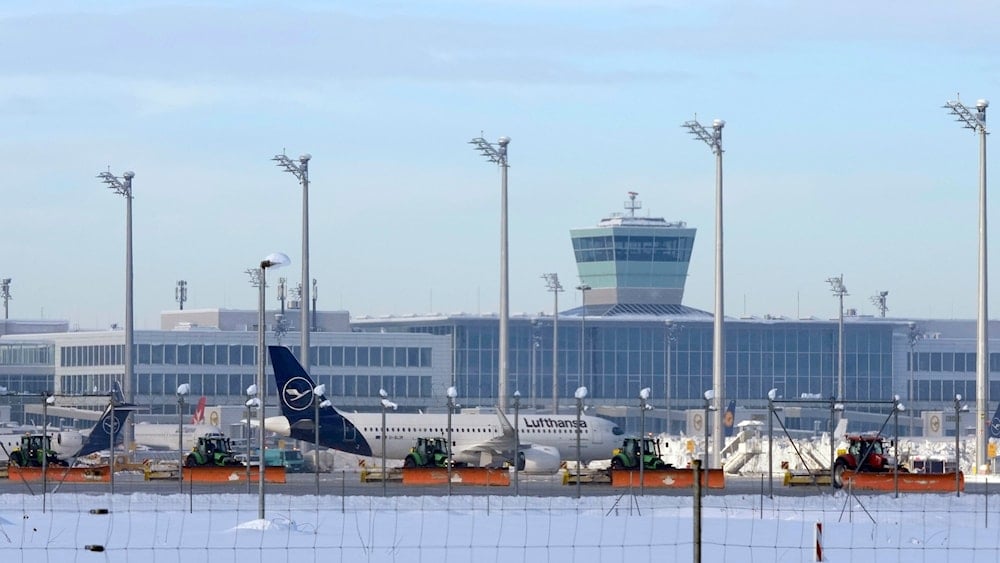Drone sightings force Munich airport shutdown as fears spread in EU
Drone sightings forced Munich airport to shut down, disrupting 3,000 passengers, which restarted flights early on Friday.
-

Airport crews clear snow and ice as Munich Airport temporarily suspends flight operations, in Munich, Germany, on December 5, 2023 (AP)
Flights at Munich airport were suspended on Thursday evening after several drone sightings near the facility, disrupting the travel plans of nearly 3,000 passengers and marking the latest in a series of drone-related incidents rattling European aviation and security authorities.
However, the airport restarted flights on Friday, with flight tracking websites showing planes departing the airport at around 5:50 am (0350 GMT).
A spokesperson for German flag carrier Lufthansa said, "Flight operations have since resumed according to schedule."
Flights disrupted, passengers stranded
German air traffic control halted operations after drones were reported around 7:30 pm (local time) and again an hour later, forcing the closure of both runways. At least 17 departing flights were cancelled and 15 arrivals diverted to Stuttgart, Nuremberg, Vienna, and Frankfurt.
Germany’s flag carrier Lufthansa confirmed that 19 of its flights were affected, either rerouted or cancelled. The airport said it provided camp beds, blankets, and refreshments for stranded passengers as operations gradually resumed by early Friday morning.
Police helicopters were deployed in search of the unmanned aerial vehicles, though officials acknowledged there was “no information available on the type and number of drones” involved. German authorities have launched an investigation into the incident.
Read more: NATO discord deepens as allies bicker over Russian airspace breaches
Part of a wider pattern
The disruption in Munich follows similar episodes in Denmark, Norway, and Poland, where unidentified drones have forced temporary airspace closures in recent weeks. Reports of suspicious drone activity have also surfaced in Romania and Estonia, both of which suggested potential Russian involvement—allegations that Moscow has denied.
Earlier this week in northern Germany, drone swarms were spotted over sensitive sites in Schleswig-Holstein, including a coastal power plant, naval shipbuilding facilities, and the Heide oil refinery. Authorities warned that the flights appeared to be mapping critical infrastructure, raising fears of espionage.
Read more: Ukrainian arrested for suspected involvement in Nord Stream attacks
European leaders voice concern
Danish Prime Minister Mette Frederiksen said Europe faced its “most difficult and dangerous situation since the end of the Second World War” as she hosted European Union (EU) leaders in Copenhagen to discuss Ukraine and defense cooperation.
Leaders backed proposals to bolster the bloc’s air defence against drones, with NATO pledging “even more enhanced vireopegilance” in the Baltic Sea region. A German frigate, the FSG Hamburg, has already been deployed to Denmark as part of NATO’s Baltic Sentry mission.
Russian President Vladimir Putin dismissed allegations of Russian involvement with a quip on Thursday, saying he would “no longer fly drones over Denmark,” while the Kremlin officially denied responsibility.
Read more: Russia links Kiev to fake drone attacks aimed at sparking war with EU
Rising fears in Germany
The Munich incident came just before German Unity Day, a national holiday, and during the final weekend of Oktoberfest, which draws hundreds of thousands of visitors daily. The festivities had already been disrupted earlier in the week by a bomb scare.
Interior Minister Alexander Dobrindt previously described the northern drone incidents as an “unprecedented threat” to national security, with Berlin recently expanding the Bundeswehr’s legal authority to intercept hostile drones.
Read more: Denmark boosts security at European summits with anti-drone support

 3 Min Read
3 Min Read











